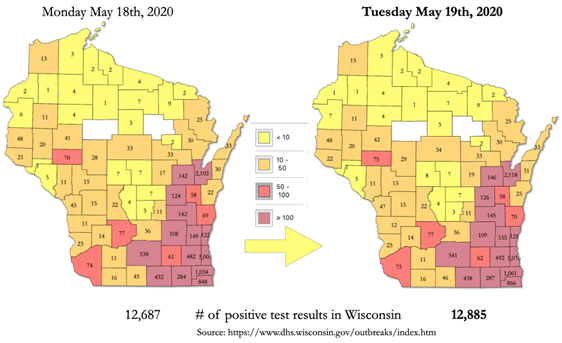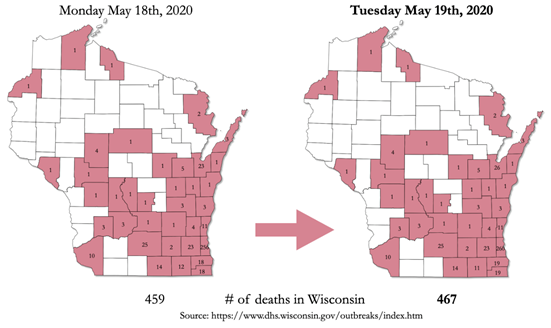Connecticut
As of May 19th
Governor Lamont signs 43rd executive order to mitigate the spread of COVID-19
Yesterday, Governor Lamont signed another executive order – the 43rd since he enacted the emergency declarations. Executive Order No. 7PP enacts the following provisions:
- Reopening Phase 1: Repeals several previously enacted executive orders to allow for the safe reopening of certain sectors of the economy on May 20, including for the reopening of outdoor dining, offices, retail and malls, museums and zoos, and outdoor recreation businesses.
- Enforcement of sector rules governing the reopening of businesses: Modifies certain statues and regulations to permit the enforcement of sector rules as certain businesses reopen on May 20, including for local and district health directors and municipal chief executive officers
- Extension of prohibition on large gatherings to June 20, 2020: Extends the prohibition of large gatherings in Executive Order Nos. 7D and 7N through June 20, 2020.
- Extension of restrictions on off-track betting, indoor fitness, and movie theaters to June 20
- Further clarification of limits on restaurants, bars, and private clubs – mixed drinks permitted for takeout delivery: Allows for the sale of mixed drinks for takeout and delivery by various liquor permittees under certain conditions.
- Limitation on the operation of day camps: Prohibits day camps, which were not already operating as of May 5, 2020, from beginning operations for the season until June 22, 2020.
- Enhanced health procedures for all day camps: Requires day camps to comply with the limitations on child group sizes and enhanced health procedure requirements placed on child care programs by Executive Order No. 7Q, and by orders of the commissioner of the Office of Early Childhood.
- Cancellation of resident camp operations: Prohibits the operation of resident camps for the duration of the civil preparedness and public health emergency.
- Limitation on the operation of summer and educational programs operated by local or regional boards of education: Prohibits summer school programs from beginning prior to July 6, 2020, unless earlier extended, modified, or terminated by the governor. The commissioner of the Department of Education is required to issue guidance on the limited operation of summer school programs that are permitted to engage in-person classes after that date.
- Suspension or modification of regulatory requirements to protect public health and safety: Permits the commissioner of the Department of Education to temporarily waive, modify, or suspend any regulatory requirements as he deems necessary to reduce the spread of COVID-19 and protect the public health.
Data updates on COVID-19 testing in Connecticut
The following is a summary of the day-to-day newly reported data on cases, deaths, and tests in Connecticut.
| Overall Summary | Statewide Total | Change Since Yesterday |
| Laboratory-Confirmed COVID-19 Cases | 38,116 | +697 |
| COVID-19-Associated Deaths | 3,449 | +41 |
| Patients Currently Hospitalized with COVID-19 | 920 | -17 |
| COVID-19 Test Reported | 177,679 | +7,072 |
Florida
As of April 18th
The Governor of the State of Florida has published an Executive Order that modifies 20-112, as modified by Executive Order 20-120, to bring all Florida counties into Full Phase 1.
Kansas
As of May 19th
SPARK Taskforce Announced
Governor Laura Kelly today announced the Strengthening People and Revitalizing Kansas (SPARK) Taskforce. The taskforce is charged with leading Kansas forward in recovery from the effects of the COVID-19 pandemic. See the following press release for more information.
Phase II of the Plan to Reopen Kansas – Executive Order
We reported earlier today that Governor Kelly announced her plan to institute a modified “Phase II” plan as it relates to reopening the state. See the Executive Order that outlines that modified plan by clicking here.
Texas
As of May 20th
Governor Abbott conducted a news briefing at 2:00 pm today at the Texas Capitol and announced that Texas will enter the next phase (Phase II) of reopening in the coming days/weeks, except for the four counties around Amarillo, Texas (where there have been outbreaks among meat packing workers), and El Paso County. In those counties the May 22nd openings are delayed one week.
Governor Abbott and others implored Texans to continue to socially distance, hand-wash and take other precautions (especially for those 65+) even as Texas reopens further.
Today’s COVID Texas numbers per DSHS:
- 47,784 confirmed cases
- 1,336 fatalities
- 25,570 estimated recovered
- 693,276 total tested
- 1,551 currently in TX hospitals
- COVID+ cases in 222 of Texas’s 254 counties.
Today’s Phase II executive order and announcement open or further reopen:
Immediate:
- Personal care services (including tattoo and massage and cosmetology) can open today.
Child care centers other than youth camps can open
- Businesses located in office buildings can open today to 10 employees or 25% of capacity, whichever is greater.
Beginning Friday, May 22 (May 29 for Amarillo and El Paso areas):
- Restaurants can move to 50% capacity (not including outdoor capacity)
Bars, wineries and breweries can open to 25% capacity
- Bowling alleys at 25% capacity
- Aquariums, natural caverns and rodeos can open to 25% capacity
- Amateur sporting events with no general public access so long as participants have tested negative for COVID-19 prior to the event.
Beginning May 29:
- Zoos can reopen outdoor areas at 25% capacity.
Beginning May 31:
- Youth and summer camps, overnight camps, and professional sports can reopen with certain limitations.
Beginning June 1
- Schools can offer summer school
- Amusement parks and water parks remain closed.
Texans are still asked not to visit nursing homes, state supported living centers, assisted living facilities and long-term care facilities.
ALSO, in recent days Texas has made the following announcements:
May 15: Governor Abbott and the Texas Division of Emergency Management (TDEM) announced that local fire departments in Texas are partnering with local public health authorities to provide testing in nursing homes throughout the state. Costs associated with providing these tests are eligible for federal reimbursement.
May 14: Governor Abbott announced that Texas Health and Human Services Commission (HHSC) has received more than $3 million in federal funding to provide shelter and services to survivors of family and domestic violence during the COVID-19 pandemic. This federal funding will support the 78 HHSC-funded local family violence centers that provide survivors with immediate shelter, supportive services, and access to community-based programs. These funds are made available through the CARES Act.
May 13: Governor Abbott and TDEM announced that the federal government has extended seven community-based testing sites in Texas through June 30, 2020. These federally-supported, state-managed, and locally-executed sites include El Paso (1), Dallas (2), Houston (2), and Harris County (2).
May 13: Governor Abbott announced the Texas National Guard has activated Facilities Disinfection Teams to support Texans in nursing homes. Six teams have already been mobilized to facilities across the state with more coming online. Each team is equipped with unique supplies such as advanced personal protective equipment, ionized sprayers, and vital oxide. The teams received training from the Texas Military Department 6th Civil Support Team, who specialize in man-made and natural disaster assessment and rapid response in hazardous environments.
Governor Greg Abbott, Lieutenant Governor Dan Patrick, and House Speaker Dennis Bonnen today sent a letter directing state agencies and institutions of higher education to each submit a plan identifying savings that will reduce respective general and general revenue related appropriations by five percent for the 2020-2021 biennium.
This has become standard operating procedure in recent years whenever Texas faces a recession or revenue challenges, such as the 2000-2001 dot.com bust and the economic crisis in 2008.
Texas has two-year budget cycles and the Legislature will not be back in regular session until January 2021, at which time they will pass a budget for 2022-2023.
The twin-hit of the COVID shutdown and oil crash has hammered state revenues. Texas is starting to reopen, but clearly the 87th Texas Legislative session – which begins January 12, 2021 – will be challenging.
Washington
As of May 18th
The Governor of the State of Washington has published a proclamation that extends Proclamation 20-49, which waives and suspends statutes and prohibits certain activities relating to garnishments of wages and other income to collect judgments for consumer debt throughout Washington State until the termination of the COVID-19 State of Emergency or 11:59 PM on May 21, 2020, whichever occurs first.
Wisconsin
As of May 19th
Updated numbers released on Tuesday:
The Wisconsin Department of Health Services and the Wisconsin Hospital Association released updated numbers on Tuesday:
- 398 Current Hospital Admissions (130 patients in ICU)
- The total number of hospital admissions increased by 19 (+19) on Tuesday
- (+13 in SE WI, +3 in SC WI, +2 in NW WI and +1 in W WI and NC WI, -1 in NE WI).
- The total number of ICU patients increased by 3 (+3) on Tuesday
- (+6 in SE WI, +1 in Fox Valley, +1 in NW WI and -3 NE WI, -1 W WI, -1 SC WI).
- The total number of hospital admissions increased by 19 (+19) on Tuesday
- Cumulatively there have been 12,885 positive tests and 148,237 negative tests in Wisconsin:
- There were 198 positive test results reported on Tuesday on 3,933 tests (5% positive rate).
- Deaths from COVID-19 now total 467 in Wisconsin:
- There were 8 deaths reported on Tuesday
- 7,012 patients who have tested positive for COVID-19 and are listed as having recovered (55%), 5,215 cases are still considered active (41%) and 459 patients have died (4%). (last updated by DHS on 5/18)
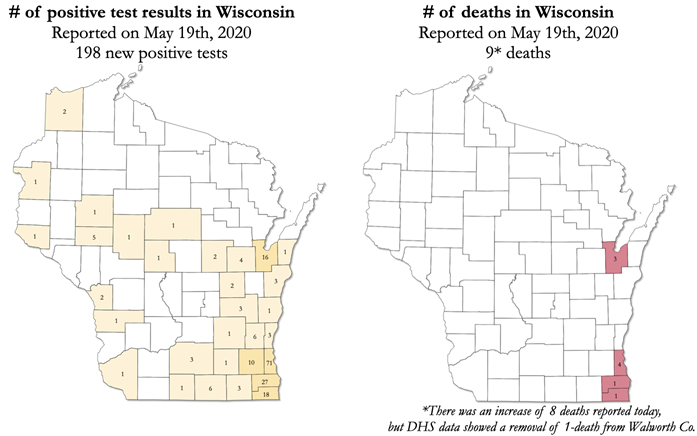
Sources:
Wisconsin Hospital Association (WHA) COVID-19 Situational Awareness Update site
DHS COVID-19: County Data; https://www.dhs.wisconsin.gov/covid-19/county.htm
Gov. Evers Announces $1 Billion Statewide Effort to support COVID-19 Testing, Contact Tracing, Operations, and Resources for Local Communities
Gov. Tony Evers today announced a $1 billion statewide effort to support COVID-19 testing, contact tracing, acquisition of needed supplies, emergency operations, and resources for local communities throughout Wisconsin. The effort is funded by $1.17 billion in federal Coronavirus Aid, Relief, and Economic Security (CARES) Act dollars.
“As I’ve said before, regardless of the political overtones of the past week, we still know what we need to do to box in this virus and help keep people safe,” Gov. Evers said. “Our statewide approach to containing the spread of COVID-19 will continue with robust testing and contact tracing efforts in all corners of Wisconsin, resources that ensure our critical workers have the equipment they need to do their jobs safely, and direct investments in local communities and health providers. Wisconsin’s Safer At Home order may have ended, but our all-out war on this virus has not.”
How the $1.17 billion is slated to be allocated:
- $260 million for testing efforts
- $202 million to provide COVID-19 test collection kits to Wisconsin hospitals, clinics, nursing homes, local public health departments, and others at no cost to ensure that everyone who needs a test receives a test.
- Approximately $3 million in funding (30,000 grants) to 96 local and tribal public health departments
- $45 million in funding to local public health departments, occupational health providers, home health agencies, and health systems to conduct COVID19 testing in congregate, community and occupational settings.
- $75 million for contact tracing
- up to $50 million will be available to local and tribal public health departments to hire additional staff to perform disease investigation, contact tracing and monitoring.
- $150 million for the acquisition of PPE.
- $40 million towards the procurement of ventilators.
- $445 million is being allocated to ensure Wisconsin hospital systems and communities are prepared to handle a surge of COVID19 patients over the summer and fall.
- $200 million has been spent by state agencies across Wisconsin in support of getting emergency operations up and running and of providing important resources and assistance to local partners across the state.
Link to press release
Tuesday Media Briefing at the State Emergency Operations Center
Department of Health Services Deputy Secretary Julie Willems Van Dijk and Wisconsin National Guard Adjutant General Paul Knapp conducted their Tuesday Media Briefing from the State Emergency Operations Center.
Of note in the briefing were;
- Discussion regarding Governor Evers’ $1.17 billion spending announcement, noting that the announcement puts dollar figures around work that has already taken place as well identifying the amount that is being reserved to handle a potential surge in cases in the Fall.
- One change of note is the discussion that DHS is having with local public health department officials about contact tracing and the state shifting from hiring the 1,000 contact tracers as state employees, to leveraging the existing local public health infrastructure helping reach the 1,000 additional contact tracers by growing out their capacity and having the state infrastructure and state contact tracers as backup.
- General Knapp was asked about the Politico story on the National Guard’s currently scheduled June 23rd end of deployment. General Knapp noted that Governor Evers and other governors has asked for an extension for that end of deployment to the end of July. But General Knapp noted that they are in the mode of knowing that they will need to wind down the deployment at some point and hand off responsibilities back to the state and local health departments that they have been doing.
The media briefing is available here.
OCI Issues Notice to Insurers on Coverage for COVID-19 Testing
The Wisconsin Office of the Commissioner of Insurance (OCI) issued a notice to insurers today aimed at clarifying federal requirements detailed in the Families First Coronavirus Response Act (FFCRA) and the Corona Virus Aid, Relief, and Economic Security Act (CARES). Testing for COVID-19 must be covered by private health insurance, including cost-sharing like co-pays for office, urgent care, and emergency department visits, said Wisconsin Insurance Commissioner Mark Afable.
“We need folks to know that testing for COVID-19 is available and can be accessed without any out-of-pocket costs,” said Commissioner Afable. “Under federal law, most insurers cannot require cost-sharing like co-pays for office, urgent care, or emergency department visits. If you have symptoms of COVID-19 or have been exposed to someone with the disease, get tested.”
Link to full press release and notice to insurers.
Status of Local Authority Safer-At-Home Orders:
Based on news stories and the Wisconsin Association of Local Health Departments and Boards website, https://www.walhdab.org/general/custom.asp?page=DraftOrders, here is the current list of health orders that have been rescinded and those that are in effect. This list changes frequently, so please check in with your local public health department for ultimate clarity.
Local Authority Health Orders that have been rescinded:
- Kenosha County: (Statement)
- City of Appleton: (Statement)
- City of Cudahy: (Statement)
- City of DePere: (Source)
- City of Menasha: (Source)
- Brown County: (Source)
- Manitowoc County: (Source)
- Green County: (Source)
- Calumet County: (Source)
- Winnebago County: (Source)
- Outagamie County; (Source)
Local Authority Health Orders that are currently in place:
- Dane County: Public Health Madison & Dane County order (effective until 5/26)
- Dunn County: Dunn County Health Administrative Order Number 20-01 (effective until 5/26)
- Door County: Order of the Door County Health Officer (effective until 5/20)
- Eau Claire County: Eau Claire City-County Health Department Prevention and Control Order (effective until 5/28)
- Florence County: Order of the Florence County Public Health (effective until rescinded/superseded)
- City of Milwaukee: Milwaukee Commissioner of Health Order
- Suburban Milwaukee County: COVID-19 Public Health Plan for Suburban Milwaukee County
- City of Racine: Order of the City of Racine Public Health Department
- Rock County: Order of the Rock County Public Health Department
Local Authority Health Order in drafting:
- Oneida County: (Draft)
Updated Charts
Daily Numbers:
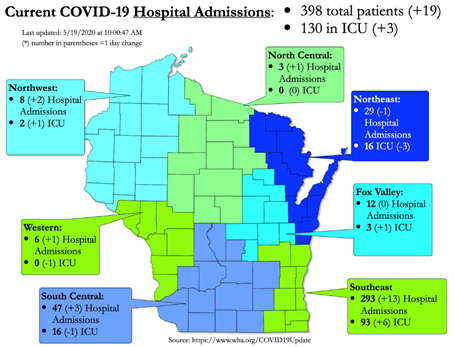
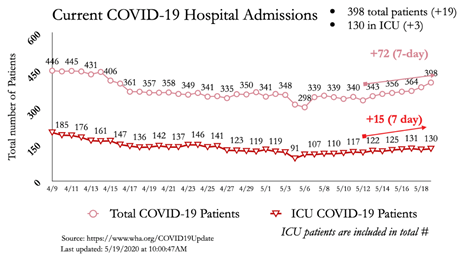
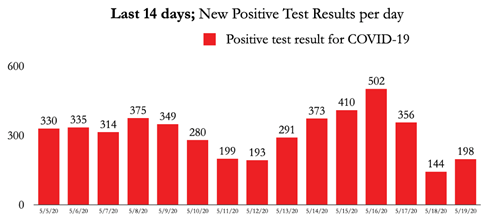
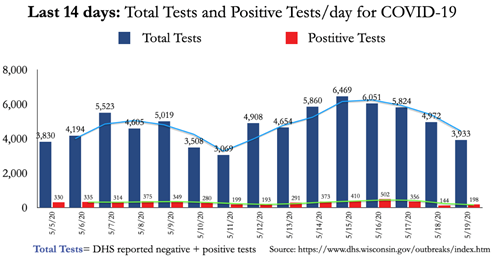
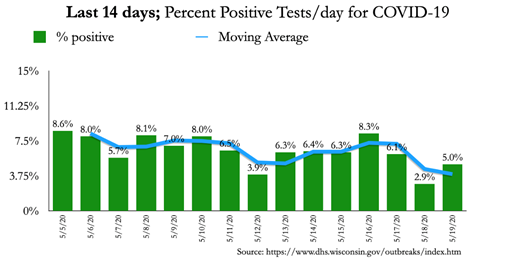

Cumulative numbers:
